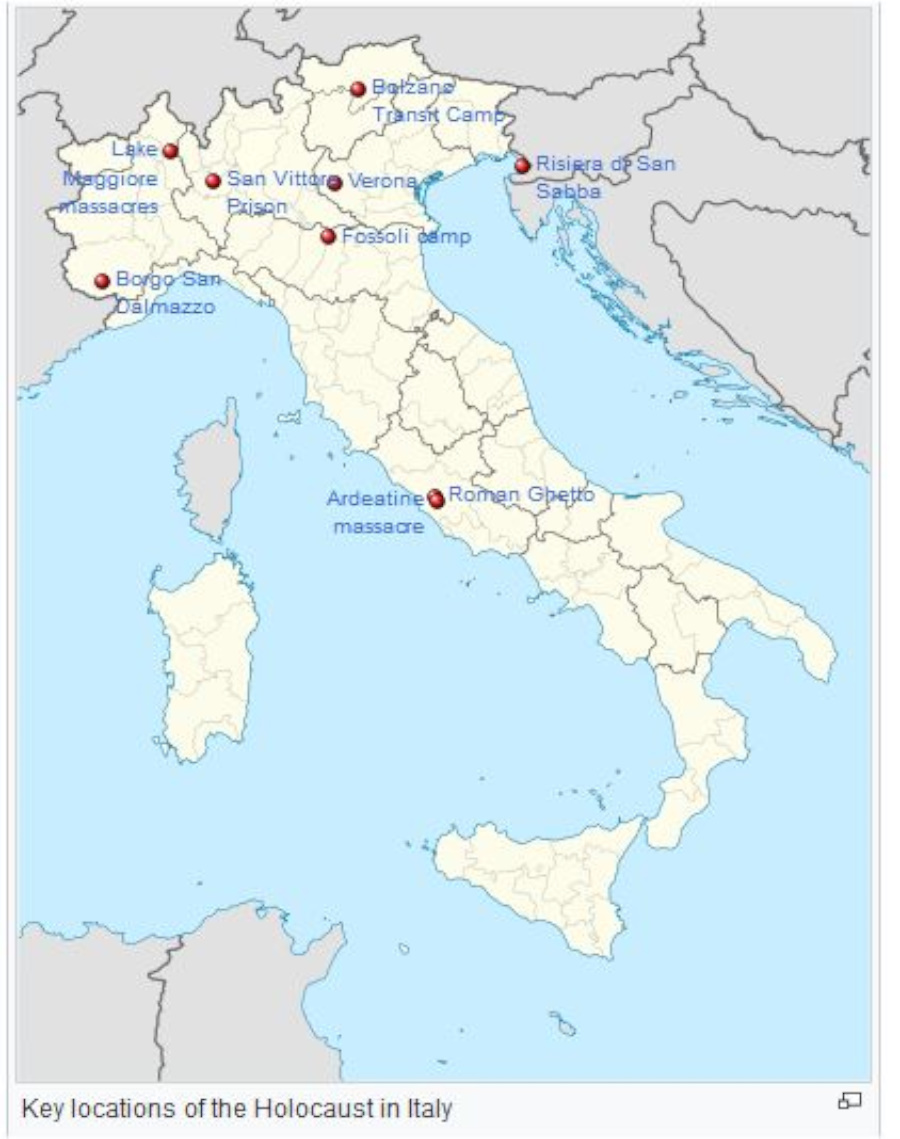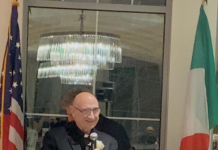
The history of Italy in World War II consists of many intertwined events – the tragic, the heroic and the overlooked, including the Jews in Italy, most of whom escaped the Holocaust because many Italians shielded them from Hitler’s genocidal vision.
While Italy under Benito Mussolini instituted harsh discrimination laws in 1938, Italian authorities opposed or subverted the Nazis’ extermination plans. In fact, many ordinary Italians actively protected Jewish residents and refugees. Joseph Goebbels the Nazi propaganda minister railed loudly in 1942 of the lax Italian attitudes toward the Jews. Italy, after all, was supposed to be a loyal ally of Hitler. After the Nazi occupation of Italy in 1943, several thousand Jews were sent to Auschwitz and other camps to die.
Still, according to various estimate, about 80 % of the roughly 45,000 Jews in Italy survived the war because an extra ordinary number of Italians did not abandon them.
How – and more importantly – why did they not abandon them.
I found a quote which hinted of an answer. It is from a Chicago attorney named Edna Selan Epstein, who was born in Yugoslavia and survived with her family as refugees in Italy under false identities provided by Italian authorities.
“Why, “she asked “was a culture so human and protective across the board as the Italians were, while another culture can be committed to sadistic horrors”.
In Israel, Yad Vashem, the Holocaust Museum and Memorial, lists more than 600 Italians as Righteous Among Nations. They represent the many Italians who risked their lives to save Jews. Among them are Giocondo and Annina Marconi, the simple villagers in Anghiari , Italy who took in the family of 7 year old Adina Sella. They were not alone. Others also helped. When the Sella family arrived at Anghiari, they were desperate. They had been kept safe in their previous hiding place – a convent school – in the town of Arezzo. However, then came a warning that Nazi’s were coming, and they could no longer be protected. They fled to Anghiari where they were met by two Italian policemen. The policemen grabbed the men, leaving the women and were gone”,she recalled. One hour, two hours, three hours…the women were besides themselves. They had no money. They didn’t know what to do or where to go. Three hours later the men came back with false identities and rations books provided to them by the police.
There are countless stories such as that of Ursula Korn Selig who was hidden by an Italian family in the Mountains. They were hidden in a bread-baking oven for three months until the American soldiers finally drove out Hitler’s army. And then there’s the account of Ida Lenti, who washed clothes of German soldiers to make money to support hidden orphaned children. She knew all along that if she was caught, she and the children would be slaughtered.
The town of Assisi was particularly active in hiding and evacuating Jews. It was a central point of assistance for Jews trying to escape a terrible fate that awaited them. It was from there that hundreds of Jews were provided false ID’s, safety in convents, private homes, and hotels. It’s estimated that nearly 300 Jews were funneled through Assisi to safety out of Italy.
One has to keep in mind that this was all done in an environment where spies were everywhere. They were mingled with the citizenry. It was extremely dangerous. Being discovered meant death for themselves and their entire family.
It should be clear, however, that 5 full years of war resulted in the deaths of 7,682 deaths of Italian Jews, most perishing in Nazi concentration camps in Poland and Germany. If it were only one death it would still be an indictment because the naked truth is that very few of these victims would have been captured without some form of Italian collaboration. However, it must be stressed that even the most critical researchers of the Holocaust admit that most, if not all, of the remaining Italian Jews not captured – about 40,000 of them – were aided by other Italians at extreme peril to themselves and by elements that supported their survival including:
(a) the fact that the Holocaust began late in Italy;
(b) the willingness of Italian Jews to accept that what was happening in other Countries could happen to them in Italy even if they were loyal Italians and allied to Germany;
(c) the characteristics of the Jewish community itself in Italy: they were few in number, they could be fed and hidden easily, and they retained their wealth because Italy had not ghettoized Jews as happened in Germany;
(d) very importantly, Italians have a cultural inclination to ignore unjust regulations even to the point of risking punishment. Susan Zuccotti, a researcher who wrote extensively on the subject, said that “…Italians seem to have a natural spontaneity and self-assurance uniquely their own”. During the occupation this amiable inclination of Italians hardened into an iron determination to evade nonsensical laws. Italian Jews – being Italians – never had the inclination to obey their government’s orders to report for interment in contrast to many Jews in other Countries. Italian Jews became as adept at fooling authorities as their non-Jewish compatriots; they were, after all Italian as well; and
(e) In addition, Italian Jews shared a character trait – a survival trait, if you will – with their non-Jewish Italian neighbors. They were incredibly stubborn and extremely individualistic. Italians – Jews or not – just don’t like being told what to do.
It must be reiterated here that these elements or circumstances were not enough to insure an 80-85 % survival rate. The hunted could never have survived without help. Susan Zuccotti – the writer and researcher I spoke about earlier – believes that the decision to rescue Jews was usually an emotional decision – spontaneous, un-calculated, irrational, and not without some cultural basis.
Zuccotti writes that one of the most cogent factors to Jewish rescue must be placed in the context of the customs and tradition of Italy, the most pertinent was the significant lack of anti-Semitism. For many reasons pre-WWII, Italy lacked an anti-Semitic tradition. The reasons for that are complex and way beyond the scope of this brief piece but suffice to say that the lack of an anti-Semitic tradition in Italy was key factor in the way non-Jewish Italians behaved during those hellish times. Let me add that if any want to delve into this more deeply let me point out two individuals who are with us today who might be able to help: Tom Damigella the de facto Historian of the Italian American Alliance and Dr. Gilda Rorro, a published scholar who just happens to be a Pirandello Lyceum I Migliori Award winner, as well as another published scholar Dr. Maria Lombardo , the wife of Robert Trifiletti and member of the Pirandello Board of Directors.
Now, the Jews in Italy before the Holocaust strongly resembled most American Jews today. They lived in a society with relatively little prejudice and no formal barriers to their achievement. Yet, the Holocaust did occur in Italy, and it behooves us to understand why. Scholars hint that its roots lay in the way Italy’s government, for financial and/or political power, imposed laws which brought the worst elements of society to the surface and intimidated others. It was endorsed by government, the press, the universities, and thousands of ranting fanatics – and sustained by a terrorized, preoccupied or just indifferent society. You may notice some American parallels.
Yet, it was clearly opposed by courageous Italians who saved thousands at the peril and cost of their own lives. Indeed, most scholars agree that the Holocaust in Italy was a blend of incredible courage and incredible cowardice, incredible nobility and degradation, self-sacrifice, and opportunities. They also agree that in contrast to other countries the worthy behavior outweighed the unworthy, but the horror was nonetheless real.
All of this brings us to the question as to how Italians behaved from the onset of Fascism. Did they recognize the firsts signs of danger with the first denial of liberty, censorship, free speech and when they first observed unequal justice? Did they do as much as they could have done?
We might also ask ourselves whether we would act as most Italians did under similar pressures. Would we risk our lives for persecuted Jews, or any minority for that matter? Would we be more sensitive to the first assaults on our liberties when the only ones being hurt in the beginning were “other people”? Would we be intolerant to the behavior of a lunatic fringe with a self-righteous agenda?
As Italian Americans the issue of anti-Semitism – whether in Italy or in America – is not simply academic and goes beyond the moral imperative. If we need an intimate reason, consider that Anti-Semitism is Anti-Italianism – or any other “ism” turned inside out. We saw it when our grandparents and parents were denied, threatened, and even murdered in America. We see it in another form when we see the symbols of our Faith and Heritage desecrated and dis-affirmed.
If there is a lesson to be learned here it is that the monster of anti-Semitism in Italy – past or present – or in America…. Anywhere – past or present -is an issue for everybody because it is a chameleon, a shapeshifter, the social manifestation of dissimulation and can show up anywhere.
I submit to you, that considering the rise in anti-Semitism in this country, the questions I posed earlier must be answered by every single person in the quiet of our own thoughts if we are to avoid an American cataclysm like what I have described. I submit to you that in your quest for answers that you pay attention to history –our Italian history. We have much to learn from it.

This article is adapted from an April 6, 2024 speech given at the “I Migliori” banquet, the Pirandello Lyceum’s celebration of the contributions of local Italian Americans.
















